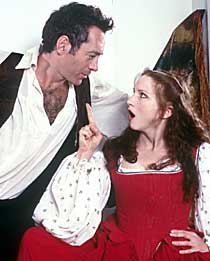The tradition of shrew-taming stories in
commedia dell’arte, as well as European and English folk drama,
was long established by the time Shakespeare took on the theme
for "The Taming of the Shrew" in 1593. Even the opening
episode concerning the character Christopher Sly, a drunken sot
with a shrewish wife, for whom the play is performed as a kind
of fantasy dream-come-true, is a common one in folk tales as
old as the "Arabian Nights."
Taking a few brilliant liberties, Kings County Shakespeare Company
(KCSC) has turned Sly (Michael Oberlander) into a drunken member
of the audience whom the actors give the lead role of Petruchio,
the tamer of the shrew. Director Liz Shipman has also changed
the father of the shrew, Baptista, into her mother, and, happily,
cast the very capable Vicki Hirsch in that role.
But for the most part, the KCSC’s production, now at Founders
Hall Theatre at St. Francis College in Brooklyn Heights, is true
to Shakespeare’s complicated and hilarious original.
Katherine (Renee Bucciarelli), the shrew, is a maiden of such
violent whims and temper that it seems unlikely she will ever
find a husband. Her younger sister, the lovable and malleable
Bianca (Sherri Pullum) has many suitors, including Hortensio
(Jon Fordham) and the elderly Gremio (Phillip Douglas), both
wealthy citizens of Padua. But their mother, Baptista, a rich
gentlewoman of Padua, insists that Bianca not marry before her
suitor-less sister.
Then Lucentio (John McCarthy) arrives from Paris with his servants
Tranio (John Flaherty) and Biondello (Frank Smith); and Petruchio
(Michael Oberlander) arrives from Verona with his servant Grumio
(Andrew Stewart-Jones). Now the sparks start to fly.
Lucentio immediately falls in love with Bianca and exchanges
clothes with Tranio so he may court her as the schoolmaster Cambio.
Tranio assumes his master’s identity to court Bianca in Lucentio’s
name, and Hortensio disguises himself as the music teacher Litio
in order to woo Bianca.
Petruchio does not exactly fall in love with Katherine, but he
is quite taken with her dowry and resolves to woo her in spite
of her fearsome reputation.
And that’s just the first few scenes. Indeed Shakespeare has
pulled out all the stops in his "Taming of the Shrew."
As Shipman says in her notes to the audience, "Every character
is in some way playing a part, as each actor is playing a part."
If figuring out who’s who in the play is so difficult that the
audience may at times be confused, the actors certainly are not.
Flaherty, McCarthy and Fordham all glide smoothly in and out
of their disguises. And Oberlander shapes and reshapes the various
elements of his roles into a consistently bawdy and likable fellow.
Katherine is never anyone but herself. Bucciarelli, with Elizabethan
garb and Shakespearean language, expertly creates a "modern"
woman who is trapped in the 16th century. For as much as Bucciarelli
fumes and fights, she will be tamed.
But Petruchio does not use the usual methods to tame Katherine.
He does not beat her into submission as other men of his day
might well have done, but rather behaves like a shrew himself,
depriving her of food, sleep and the clothing she craves under
the guise of only wanting the very best for his wife.
Petruchio is aided in his task by his clever servant Grumio.
Stewart-Jones brings to this role the same wry wit and mischievous
character that he brought to the role of the sprite Puck in KCSC’s
"Midsummer Night’s Dream" last season.
"The Taming of the Shrew," with its emphasis on wifely
obedience, has often been seen as anathema to contemporary women.
But as Shipman makes perfectly clear in this production, Shakespeare’s
comedies are complex and multileveled.
The Bard, as always, pleases the groundlings with slapstick,
bawdy jokes and an ending that keeps women safely in their place.
At the same time, he writes for the future, describing the way
men and women work out their relationships in accordance with
and in spite of their cultural and moral environment.
Shipman is acutely aware of both Shakespeares and brings them
to life intriguingly and seamlessly. By emphasizing that the
play-within-a-play is mere illusion, she keeps alive the question:
Just what was Shakespeare saying to his audience back in the
16th century, and what does he have to tell audiences today?
This is theater, and Shakespeare, at their best.
"The Taming of the Shrew"
[at Founders Hall Theatre, St. Francis College at 182 Remsen
St.] plays through July 1, Tuesdays through Saturdays at 8 pm,
Saturday and Sunday matinees at 2 pm. Suggested donation $5.
For reservations, call (718) 398-0546.

























